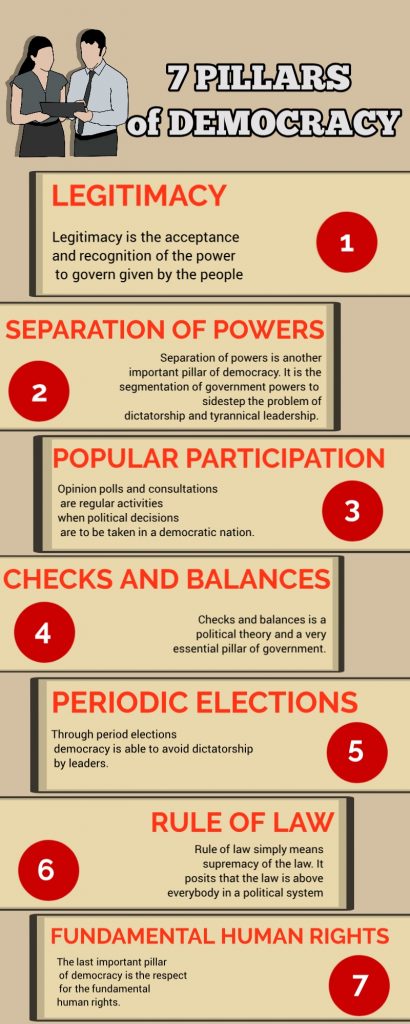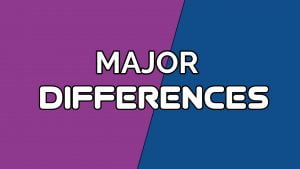There are various forms of government and the two which are relevant to this discourse are democracy and republic. In this article, we will be taking a critical look at the differences between democracy and republic. Democracy is defined by Aristotle as the government of the people, by the people and for the people while a republic is a form of government where, the power of government is held by the people who give power to leaders they elect to represent them and serve their interests and the representatives are responsible for helping all the people in the country, not just a few people.
To understand the differences between a republic and a democracy, it is essential to, first of all, understand what the two systems of government entails. Consequently, I will be explaining, in details, the meaning and characteristics of democracy and republic.

RECOMMENDED: Differences between military rule and democracy
Meaning of Democracy
Democracy is literally, rule by the people. The term is derived from the Greek word dēmokratia, which was coined from dēmos meaning people and kratos meaning rule. Democracy was seen in the middle of the 5th century to denote the political systems then existing in some Greek city-states, especially Athens.
Democracy as defined by Aristotle and given above as a government by the people is a form of government in which the supreme power is vested in the people and exercised directly by them or by their elected agents under a free electoral system. A nation with this form of government is also referred to as a democracy.
There are two major types of democracy which are direct democracy or democracy by assembly and indirect or representative democracy.
1. Direct democracy: This can be said to be the best form of democracy but it has become impracticable in most society as a result of the population burst. It is a situation where citizens meet periodically to discuss issues affecting the community. It is a simple system which is easily applicable in small communities and states only as everyone is required to participate actively.
2. Indirect democracy: In contrast to a direct democracy, the people in an indirect or representative democracy elect representatives who act on behalf of them. In our world today, it is inefficient and almost impossible to have every eligible citizen vote on every issue, every arising piece of legislation that it takes to run a city, a state, or a country and this is mostly due to the population. Instead, citizens vote for leaders to do the work of governing for them.
Indirect democracy has therefore replaced direct democracy and has come to stay in modern political systems. The other type of democracy is the constitutional democracy.
Also see: Features and characteristics of democratic system of government
Meaning of a Republic
The word republic was first recorded in English between 1595–1605. It comes from the Latin words rēs pūblica, meaning “public thing,” characterizing that a state is ultimately run by its people as opposed to monarchy or tyranny. For nearly 500 years, ancient Rome was a republic before it became ruled by emperors.
A republic is defined as “a state in which the supreme power rests in the body of citizens entitled to vote and is exercised by representatives chosen directly or indirectly by them as opposed to a monarchy where the succession is hereditary. The primary positions of power within a republic are attained through democracy or a mix of democracy with oligarchy or autocracy rather than being unalterably occupied by any given family lineage or group. With modern republicanism, it has become the opposing form of government to a monarchy and therefore a modern republic has no monarch as head of state.
Also see: Top 10 Richest Lawyers in India
Some of the characteristics of a republic are;
1. Term of office: The leaders elected under a republican system of government are usually in office for a fixed period of time upon expiration of which another election takes place.
2. Popular and periodic elections: the succession to various political offices in a republic occurs through a popular election which must also take place periodically. Every four years as it is in the case of Nigeria.
Rule of law reigns supreme where the rulers abide by the provisions of the constitution and this also leads to the limitations to the exercise of power by political leaders.
This form of government is regarded as a public matter.
Republican forms of government
Presidential republic: This is one with an executive presidency separate from the legislature
Semi-presidential system: This is where there exist both an executive presidency and a separate head of government that leads the rest of the executive, who is appointed by the president and accountable to the legislature
Parliamentary republic: This is a system with a ceremonial and non-executive president, where a separate head of government leads the executive and is dependent on the confidence of the legislature
Republics in which a combined head of state and government is elected by, or nominated by, the legislature and may or may not be subject to parliamentary confidence.

Similarities between Democracy and Republic
Some of the similarities between a democracy and a republic are as follows;
1. In both a republic and a democracy, citizens are empowered to participate in a representational political system. They elect people to represent and protect their interests in how the government functions.
2. Republics and democracies both provide a political system in which citizens are represented by elected officials (elected by the peoole themselves) who are sworn to protect their interests.
3. In a pure democracy, laws are made directly by the voting majority leaving the rights of the minority largely unprotected.
4. In a republic, laws are made by representatives chosen by the people and must comply with a constitution that specifically protects the rights of the minority from the will of the majority.
5. A country can have more than one type of democracy and a country can have more than one type of Republic as well.
RECOMMENDED: Differences between cross-offers and counter-offers in the law of contract

Top 7 Differences between Democracy and Republic
Some of the differences between a democracy and a republic are as follows:
1. Athenian Democracy in Greece is an early example of democracy while the early example of the Republic is the Roman Republic as manifested in (510 BC – 27 BC).
2. There are three (3) major types of democracy which are the, Direct democracy, Representative Democracy and Constitutional Democracy while the five (5) types of Republics are Constitutional Republic, Parliamentary Republic, Presidential Republic, Federal Republic, and Theocratic Republic.
3. In Democracy the power is in the hands of the people while in the Republic, the power is in the hands of individual citizens.
4. In a democratic system, laws are made by the majority while in the Republic system, laws are made by the elected representatives of the people.
5. In a democracy, the will of the majority has the right to override the existing rights. In the Republic system however, the will of the majority cannot be overridden since the constitution will protect those rights.
6. In a Democracy there are no constraints on the Government while in a Republic there are constraints on the Government in exercising their powers and functions.
7. In a Democracy, the main focus is the general will of the people while in a Republic, the main focus is on the Constitution.
In addition to the above points, I strongly recommend that you watch the video before for a better explanation of the differences between democracy and republic. Trust me, you will enjoy it.
Also see: Top signs to know an intelligent person
Conclusion
In conclusion, what you should take away in the confusion or debate over democracy and republic is that, in both forms of government, power ultimately lies with the people who are able to vote. Eligibility to vote is equal to true democracies and republics.

Edeh Samuel Chukwuemeka, ACMC, is a lawyer and a certified mediator/conciliator in Nigeria. He is also a developer with knowledge in various programming languages. Samuel is determined to leverage his skills in technology, SEO, and legal practice to revolutionize the legal profession worldwide by creating web and mobile applications that simplify legal research. Sam is also passionate about educating and providing valuable information to people.